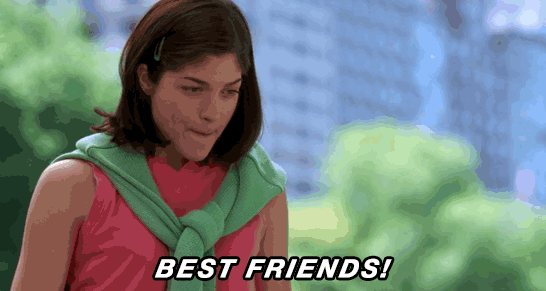REVIEW: "The Good Friend" by Jo Baldwin
As an adult, having — or at least, declaring — a best friend is decidedly less important than it was in childhood.
In fact, it would seem quite odd for one grown woman to introduce you to another saying, “Oh you just have to meet my best friend, Monica. Sometimes...on Saturdays… we have sleepovers and braid each other’s’ hair!"
But, despite this disinclination to publicly identify and/or demonstrate enthusiasm about a best friend, I think we all have one.
As I think back on the friendships I’ve had in my now 36 years — assigning numbers to the categories in the imaginary rubric in my head — it becomes immediately clear that I, too, have a best friend. Though, like most adult women, I see her too seldom, our histories or so intertwined that not thinking about her on a relatively regular basis is an impossibility.
Any time I zip through a Starbucks, I remember our high school coffee runs that too often resulted in tardiness.
When I plan a vacation, I remember our senior trip to Hershey, PA, of all places, where we toured the chocolate factory, stayed in a truly shitty hotel, and enjoyed the fanciest dinner either one of us had, up to that point, consumed.
And whenever I read a book or watch a movie set anywhere in the UK, I remember our semester spent abroad — an opportunity we decided to explore while consuming some college-dining-hall mac and cheese after admittedly too many repeat viewings of BBC's “Pride and Prejudice”.
My best friend was — is — authentically, a good friend.
She’s caring and compassionate and considerate.
She really would be a good ride-or-die
*Note - This wins an award for the most WTF gif I’ve ever found. My thought process as I watched it the first time: Oh… they are riding dogs. Oh… they are wearing sombreros. Oh… they are monkeys. Literally, love!
Anyway, Jenny, the protagonist of this novel, didn’t have it as easy as me in the best friend department. Her history with her BFF is murkier. And their lasting mutual affection less certain.
For the majority of Jenny’s childhood, her life was what you would categorize as “normal.” She went to school, she had a best friend and, eventually, she had a boyfriend.
But when a teacher mentions to her father that Jenny shows a particular aptitude for swimming, her father grabs this piece of information and runs with it, dedicating his every waking hour to helping Jenny become the world’s best swimmer — whether she shares the aspiration or not.
In an effort to facilitate the development of her swimming skills, he plans a move to Australia.
Jenny goes along, begrudgingly — because, at the end of the day, swimming is really more his thing than it is hers. Amplifying her resistance to embrace this move is the fact that doing so will mean leaving behind her best friend, Kath, and her boyfriend, Tom.
* Fast forward eight years *
Now adult Jenny — who has, by this point, at least satiated her father’s hunger for fame by winning a few gold medals — is having a crisis of sorts.
She’s no longer willing to let swimming be her entire life.
Against her father’s wishes, she embarks on a trip to Europe. Away from Australia — and, more importantly, out from under the watchful eye of her father — she can let that lingering chlorine smell she’s acquired after years of endless lap-swimming fade and take some much needed time to herself.
During her travels, she plans to stop in France to visit former-best-friend Kath and former-boyfriend Tom — who now oh-so-uncomfortably-for-Jenny are married … to each other.
When what was planned to be a short visit to Kath and Tom’s home extends in duration, Jenny finds herself questioning not just what her future relationships with Kath and Tom might look like, but also what really happened in the past.
Marketed as a thriller, this novel did have elements of suspense, though it is vastly different from many of the fast-paced modern thrillers that you can very easily read in about a day and just as easily forget in about a week.
Unlike those thrillers, there wasn’t a whole lot that happened in this novel, honestly.
But that wasn’t necessarily a bad thing.
As I moved through the novel, it didn’t feel plodding and protracted and pointless.
Quite the contrary, the slow pace somehow only intensified the subtle tension that the nuanced plot effectively built.
Author Jo Baldwin took her time, unapologetically making her readers wait for action to occur — just as her protagonist had to wait for the long French summer to pass.
But when exposition gave way to action it made the action so much... richer...more meaningful.
The absolute biggest what-the-actual-fuck moment in this book was the ending.
All too frequently, I encounter books in which the ending kills it.
When this happens, I sigh.
And I set the book down.
And I shed a single tear for another book ruined by a shitty ending.
This ending-ruining-the-book phenomenon has become so common, in fact, that I now don’t even hazard a guess as to what my cocktail rating will be until I’ve fully finished the novel.
I’m just that resigned to shitty endings.
So, imagine my surprise, when the conclusion of this book had quite the opposite effect on the overall quality of the work than the negative one to which I have grown accustom.
In this novel, the ending was literally the best part.
Especially strong: the postscript of this book. It changed everything...In the most satisfying of ways.
Having now finished this book — and waited about a week to pen the review, as I usually do — I can say that, as a whole, I found it largely successful.
Honestly, my only issue with this novel was a tiny believability-related one.
*Spoiler Alert*
As we approach the end, we find out that it wasn’t Kath whose actions led to the death of the beloved family pet, Pilot — cute name, BTW — but, instead, Jenny.
But, apparently, Jenny didn’t mean to kill Pilot. It was an accident.
You see, Instead of mixing bones into the dog food — which, is that like a thing you weirdo dog-owners really do anyway? #Cats4Lyfe — she accidentally blended in rat poison.
So…
Okay…
Like…
Hmm…
Is French rat poison seriously that fucking different from American rat poison?
Is it large and rigid and uniformly bone shaped?
How on earth could a reasonable person mean to mix biscuits into dog food and accidentally mix in rat poison?
Though admittedly nitpicky, this believability issue really bothered me because I had been waiting, as I read, for the reliability of the narrator to be called into question.
But, when it finally happened - that way - it just didn't make any fucking sense.
*End Spoilers*
All factors considered, though, I found this novel to be… refreshing.
Yes, it was different from the mass-market thrillers — which I admittedly devour on the fucking daily — but it was different in a good way.
Baldwin took time, letting the tension build.
And she used her twists judiciously. Instead of inducing whiplash — and hindering believability — with twist after twist after twist, she included a few, believable, well-placed twists that enhanced the quality of the book as a whole.
This one earns a solid 4 out of 5 cocktails.
On to the next book. Want to see what I select? Follow me, here.
IMO, Kath was way out of line marrying Tom. Like, bitch, the sea is full of fucking fish… fish who neither dated… nor deflowered... your BFF. My question this go around is decidedly un-bookish, but I can’t help but wonder, what’s your opinion? Is a best friend’s former boyfriend off limits? Tell me about it in the comments, below.
* Drink. Read. Repeat. is a participant in the Amazon Services LLC Associates Program, an affiliate advertising program designed to provide a means for sites to earn advertising fees by advertising and linking to Amazon.com. As an associate, we may earn commissions, at no cost to you, from qualifying purchases on Amazon.com











